新编大学英语教案(第二册)_unit2communicationproblems
新编大学英语2 unit 2 communication problems
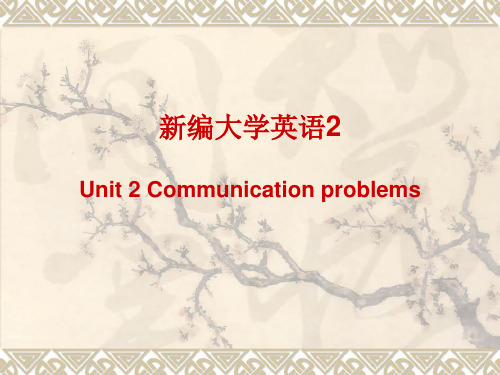
Paraphrase: When Martians and Venusians have a meeting for the first time, they met many of the problems with relationships that still exists today.
Ⅰ. Background Information
1. Useful Information
It is well-known that learning a second language is never easy, and, generally speaking, the older one is when one attempts a new language, the more difficult it becomes. This is at least partly due to what is known as language interference, meaning that the linguistic patterns of our first language interfere with those of the second because no two languages have exactly the same sounds and grammatical structures. The English language has a very large vocabulary because it has incorporated words from many other languages over the centuries. This is nowhere more apparent than in its color words. For example, there are many words that express the color “purple”, describing its different shades and hues: mauve, violet, lilac, or lavender. An interesting linguistic gender difference among native speakers of English is the likelihood of women using these color terms to differentiate between shades of purple, whereas, men will be satisfied with the one word “purple”. This is true of other color words too.
新编大学英语2教案
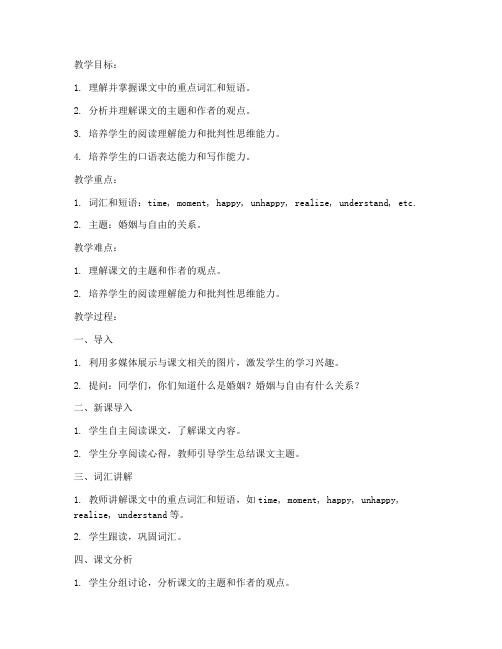
教学目标:1. 理解并掌握课文中的重点词汇和短语。
2. 分析并理解课文的主题和作者的观点。
3. 培养学生的阅读理解能力和批判性思维能力。
4. 培养学生的口语表达能力和写作能力。
教学重点:1. 词汇和短语:time, moment, happy, unhappy, realize, understand, etc.2. 主题:婚姻与自由的关系。
教学难点:1. 理解课文的主题和作者的观点。
2. 培养学生的阅读理解能力和批判性思维能力。
教学过程:一、导入1. 利用多媒体展示与课文相关的图片,激发学生的学习兴趣。
2. 提问:同学们,你们知道什么是婚姻?婚姻与自由有什么关系?二、新课导入1. 学生自主阅读课文,了解课文内容。
2. 学生分享阅读心得,教师引导学生总结课文主题。
三、词汇讲解1. 教师讲解课文中的重点词汇和短语,如time, moment, happy, unhappy, realize, understand等。
2. 学生跟读,巩固词汇。
四、课文分析1. 学生分组讨论,分析课文的主题和作者的观点。
2. 教师总结学生的讨论结果,引导学生理解课文的深层含义。
五、拓展活动1. 学生分角色朗读课文,提高口语表达能力。
2. 学生根据课文内容,进行角色扮演,展示自己对课文的理解。
六、写作训练1. 学生根据课文主题,写一篇短文,表达自己对婚姻与自由关系的看法。
2. 教师批改学生作文,给予反馈。
七、总结1. 教师总结本节课的教学内容,强调重点和难点。
2. 学生回顾本节课所学,提出疑问。
教学反思:本节课通过导入、新课导入、词汇讲解、课文分析、拓展活动、写作训练等环节,帮助学生理解课文内容,掌握重点词汇和短语,培养学生的阅读理解能力和批判性思维能力。
在今后的教学中,我将进一步关注学生的个体差异,提高教学效果。
(完整版)全新大学英语第二版BOOK1-UNIT2教案

Teaching Plan of Unit 1, Book 1FriendshipText A All the Cabbie Had Was a LetterTeaching Objectives:Students will be able to1.grasp the main idea (never delay expressing your true feelings to a friend) and structure of Text A(developing a story around a letter);2.appreciate characteristic features of spoken English as demonstrated in Text A (spoken English ismuch more informal than written English);3.master the key language points in Text A and learn how to use them in context;4.understand the cultural background related to the content;5.express themselves more freely on the theme of Friendship after doing a series of theme- relatedreading, listening, speaking and writing activities;6.Write a personal letter in an appropriate way.Time Allotment:4-5 class hoursTeaching Methodology: student-centered; group work, pair workTeaching Procedures:I. Pre-reading tasks1. Think- pair-share: Ask students to brainstorm proverbs about friendship.Suggested answers:Friends are like the stars on a cloudy night. You can't always see them, but they are there. Friendship cannot stand always on one side.Between friends all is common.False friends are worse than open enemies.A friend to all is a friend to none.The friendship that can end was never real.A friend is easier lost than found.A friend in need is a friend indeed.Friends are like wine; the older, the better.Good company on the road is the shortest cut.True friendship is like sound health; the value of it is seldom known until it is lost.Ask students to choose the proverb they like best and give reasons.2. Survey--- Do you often write letters to your friends?Question and answer: Which do you think is the best way in expressing our innermost feelings?II. Text Learning:Task 1: Topic-related PredictionWhat does a cabbie do?What is a letter used for?Who wrote the letter to the cabbie?Why was all the cabbie had only a letter?Task 2: Scanning (see PPT)Scan Text A and decide which of the following statements is the theme.1. One should keep in touch with his friends.12. Never delay expressing your true feelings to a friend.3. A true friend will stand by you forever.4. Late is better than never.Task 3: Group work: Divide the text into smaller parts and assign them to different groups. Ask the students to work in groups and do the following:▪Step 1: Read the assigned part, and try to understand its meaning.▪Step 2: Ask and tell each other about the difficulties in understanding this part.▪Step 3: Make a list of useful words and phrases.▪Step 4: Choose one member to make a short report to the class.Task 4: Language study1) T leads the students’ attention to the colloquial sentences:▪Go ahead and finish your letter.▪I’m not much of a hand at writing.▪We were kids together, so we go way back.▪You kind of lose touch even though you never forget.▪It’s no fun to lose any friend.2) Study the language points and practice them.be lost in; available; go ahead; know\ learn by heart; estimate; might as well\ may as well;keep up; correspondence; practically; neighborhood; kind of\ sort of; lose touch with; come up;urge; postpone; reference; absolutely; reunion; hang out; every now and then; choke up;destination; skip; right away3) Game: Flash Cards (Vocabulary Activity)After practicing the above, ask Ss to work in pairs▪Step 1: Through discussion, delete those they have already grasped.▪Step 2: Divide the rest of the words and phrases into two groups, and each student will be deal with one of the group. Write down the words and phrases on cards ( one on each card). Find out their English explanations, and write them down on the back of the corresponding cards.▪Step 3: Practice: One gives the explanation, and the other guesses the word or phrase.▪Step 4: Ss exchange roles and go on practicing.▪III. Post-reading activities:1. Dictogloss (an activity that combines elements such as dictation, cooperation, oral practice and grammar etc.):Step 1: T prepares a paragraph either related to the topic or a grammar item, writes down the difficult words on the board if there are any;Step 2: First listening: Ss are required to listen only, without writing anything;Step 3: Second reading: Ss are required to write down the key words, without worrying about the spelling mistakes;Step 4: Ss work in groups to reconstruct the article, trying to write down every sentence with correct spelling and sentence structure.Step 5: Ask Ss to write what they have got on a big piece of paper, or share with the class orally; Step 6: T shows the original text, comments on what the students have done and explains the grammar points.22. Writing:Directions: Write a letter (at least 120 words) to your best friend, following the outline given below:1)Your feeling about your new life in the university;2)How you miss him\ her and the time you had together.3)Inviting him\ her to pay you a visit.3. Suggested song: Cry on my shoulder4. Suggested movie: Mary and Max3。
新编大学英语(第二版)第二册课后答案
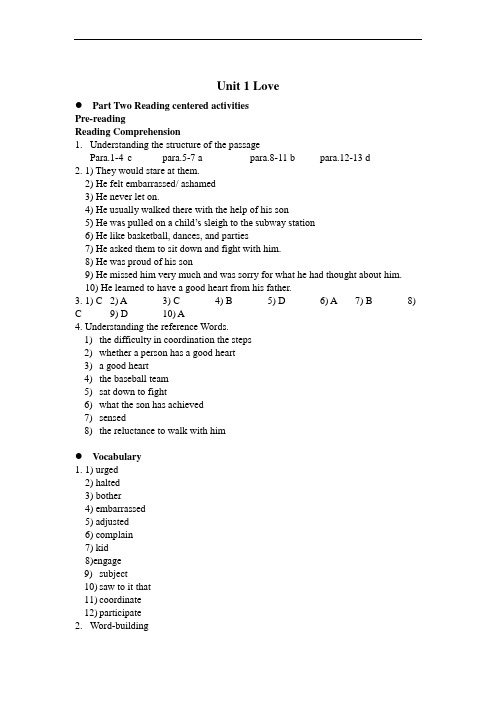
Unit 1 Love●Part Two Reading centered activitiesPre-readingReading Comprehension1.Understanding the structure of the passagePara.1-4 c para.5-7 a para.8-11 b para.12-13 d2. 1) They would stare at them.2) He felt embarrassed/ ashamed3) He never let on.4) He usually walked there with the help of his son5) He was pulled on a child’s sleigh to the subway station6) He like basketball, dances, and parties7) He asked them to sit down and fight with him.8) He was proud of his son9) He missed him very much and was sorry for what he had thought about him.10) He learned to have a good heart from his father.3. 1) C 2) A 3) C 4) B 5) D 6) A 7) B 8)C 9)D 10) A4. Understanding the reference Words.1)the difficulty in coordination the steps2)whether a person has a good heart3) a good heart4)the baseball team5)sat down to fight6)what the son has achieved7)sensed8)the reluctance to walk with him●Vocabulary1. 1) urged2) halted3) bother4) embarrassed5) adjusted6) complain7) kid8)engage9)subject10)saw to it that11)coordinate12)participate2.Word-buildingpatiencebitternessfortuneknowledgeablereluctantentrancecomplaintenviousmemorablefrustration1)bitter2)fortunate3)patience4)memorable5)reluctant6)entrance7)complaints8)envious9)knowledgeable10)frustration●Translation1.He walks slowly because of his bad leg.2.He came to the meeting despite his serious illness.3.He saw to it that the same mistake didn’t happen again.4.Now that they’ve got to know each other a little better, the get along just fine.5.Then I found myself surrounded by half a dozen boys.6.I send you my best wishes on this happy occasion.●Part Three Further development3.What is love?1)causes2)offers3)to4)not5)tell6)calls7)attracted8)discovers9)weak10)disappointed11)distance12)out●Part Four Writing and Translation2. Translation Practice1.From Chinese into English1)support a big family2)care for her children and parents3)pay for his children’s education4)after years of diligent research5)the financial burden on his shoulders6)She has a golden heart/ a heart of gold and loves people around her.7)My father has never bought any toys and candies for my younger brother andme, but I know he loves us.8)My parents do their best to meet our needs and always keep their promises. 2.From English into Chinese1)他从来不感到疲劳,非常喜欢干活,而且说话不多。
大学英语听力b2_listening_unit_2_Communication
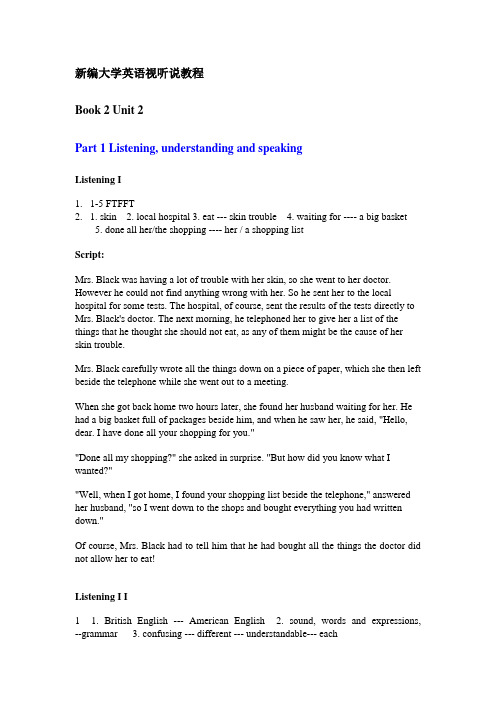
新编大学英语视听说教程Book 2 Unit 2Part 1 Listening, understanding and speakingListening I1.1-5 FTFFT2. 1. skin 2. local hospital3. eat --- skin trouble4. waiting for ---- a big basket5. done all her/the shopping ---- her / a shopping listScript:Mrs. Black was having a lot of trouble with her skin, so she went to her doctor. However he could not find anything wrong with her. So he sent her to the local hospital for some tests. The hospital, of course, sent the results of the tests directly to Mrs. Black's doctor. The next morning, he telephoned her to give her a list of the things that he thought she should not eat, as any of them might be the cause of her skin trouble.Mrs. Black carefully wrote all the things down on a piece of paper, which she then left beside the telephone while she went out to a meeting.When she got back home two hours later, she found her husband waiting for her. He had a big basket full of packages beside him, and when he saw her, he said, "Hello, dear. I have done all your shopping for you.""Done all my shopping?" she asked in surprise. "But how did you know what I wanted?""Well, when I got home, I found your shopping list beside the telephone," answered her husband, "so I went down to the shops and bought everything you had written down."Of course, Mrs. Black had to tell him that he had bought all the things the doctor did not allow her to eat!Listening I I1 1. British English --- American English 2. sound, words and expressions, --grammar 3. confusing --- different --- understandable--- each2. British EnglishI don’t know.What do you say?jumpertrouserschipschemist’s shopring them upHave you got an extra pen?Script:American and British people both speak English, of course, but sometimes it does not seem like the same language. In fact, there are some important differences between British and American English.First of all, they sound very different. Often, Americans don't say all the letters in each word. For example, Americans may say "I dunno" instead of "I don't know", or they may say "Whaddya say?" instead of "What do you say?"Sound is not the only difference between British and American English. The two languages have different words and expressions for some things. For example, some words for clothing are different. Americans use the word "sweater", but the British say "jumper". Americans wear "vests" over their shirts, but British people wear "vests" under their shirts. Americans talk about "pants" or "slacks", but the British talk about "trousers". The British chips are American French fries. A British chemist is an American drugstore. In Britain, if you are going to telephone friends, you "ring them up". In America, you "give them a call".There are also some differences in grammar. For example, Americans almost always use the helping verb "do" with the verb "have". They might say, "Do you have an extra pen?" The British often ask the question a different way. They might say, "Have you got an extra pen?"These differences can be confusing when you are learning English. But when the same language is used in different places, it is understandable that it changes in each place.Listening III11-6 T F F F F T21) small 2) pie 3) pine 4) big 5) small 6) pint 7) half 8) German9) warm 10) brown 11) English 12) a packet of 13) in the evening14) fried potatoes 15) crispsScript:Nick: Hi, Dieter. OK?Dieter: Oh, hi, Nick. Yes, I'm fine, except that I had a big problem ordering my drink.I didn't think my English was so bad!Nick: Your English is very good! What kind of problem?Dieter: Well, look at this beer I've got here—this warm, brown, English beer—it wasn't what I wanted!Nick: Why, what did you ask for?Dieter: Well, I just asked for a small beer. Then the barman asked what type of beer and said lots of names that I didn't understand—and something about a pie or a pine. I didn't understand anything!Nick: Oh, no! He probably said a pint! In English you don't ask for a big or a small beer. You ask for either a pint or a half. A pint's the big one.Dieter: So this one I've got here is a half?Nick: Yes, that's a half of bitter. Bitter's the name for that type of beer.Dieter: Ah, that's what he said—bitter! Well, it's very different from the beer we drink in Germany, I must say.Nick: Yes, I know. They call the German type of beer lager. So you have to ask for a half of lager, or a pint of lager.Dieter: OK. I understand that now. My another problem was chips. I asked for a packet of chips, and the barman said something strange—that they don't have chips in the evening, only at lunchtime. What did he mean?Nick: Yes, they have fish and chips, but I think you meant crisps. In England, chips are fried potatoes, you know, French fries. The ones you buy in a packet are crisps. Dieter: Well, in the end I didn't get anything to eat. So you see, I did everything wrong!Listening IV11-5 F T T F T2Examples: 1. MEN 2. HIS 3. MAN-madeConsequences: 1. mental image --- females/women 2. females/ women --- males/ men 3. citizensScript:(Mr. and Mrs. Jones are having a conversation one evening while Mrs. Jones happens to be looking at some of the textbooks her daughter, who is in the fifth grade, is using.)Mrs. Jones: Listen to what this book says. It really makes me angry! When talking about the settling of the western part of the U.S., it says, "MEN by the thousands headed west." Then on the very same page it says, "The average citizen in the United States is proud of HIS heritage."Mr. Jones: What's wrong with that? It's true. I don't understand why you are angry. Mrs. Jones: Why? Because women are left out!Mr. Jones: Everyone knows when the author says "men" or "his" in those sentences that the author means to include women.Mrs. Jones: I think you are wrong. When young people read these sentences, they simply do not form a mental image which includes females.Mr. Jones: Mm. Do you have other examples?Mrs. Jones: Yes I do! This book mentions "MAN-made improvements that have raised America's standard of living". A child will not think that females as well as males have made contributions when reading this.Mr. Jones: I still don't think it's very important.Mrs. Jones: Of course you don't! You're a man. But don't you want our daughter and other little girls to have the idea that they can be important citizens in their country, just as other women have been in the past?Mr. Jones: Well, I guess you're right. I hope not all textbooks are like that.Part 2 Viewing, understanding and speaking11-6 T F F F F T21) or another 2) seeing each other 3) boating 4) half an hour 5) someoneelse 6) anymore 7) Of course I do. 8) two different places 9) stupid Script:(The telephone rings in Julia's home, and she picks up the phone.)Julia: Hello!Michael: Hello, this is Michael.Julia: Hi, Michael. How are you?Michael: I'm fine. I miss you a lot though.Julia: Me, too. Can we get together again before you leave?Michael: Yes, sure! That's why I called you.Julia: Where should we meet?Michael: Mm, how about in front of Wanghu Hotel? (Some people are talking loudly in Julia's home.) That's not far from your home.Julia: Which hotel? I didn't hear you clearly.Michael: Wanghu Hotel.Julia: OK! What time?Michael: Mm, how about 12:30, tomorrow afternoon?Julia: OK, see you then.Michael: OK. OK, see you then.(In front of Wanghu Hotel, Michael is waiting. But Julia is waiting in front of Huanhu Hotel.)Michael: (He Looks at his watch, talking to himself.) It's 1:35 now! What's wrong with her?Julia: (She Looks at everywhere, hoping to see Michael, then talking to herself.) He's always late!Michael: (He Looks at his watch again, talking to himself.) Maybe she doesn't want to see me again?Julia: (She Looks at her watch, talking to herself.) It's almost 1:45 now! Where is he? Can it be that he is waiting at Wanghu Hotel? (Julia quickly rushes to Wanghu Hotel. There she sees Michael, who stands there waiting anxiously.)(In front of Wanghu Hotel.)Michael: Hi, Julia. You are so late. How come?Julia: I'm late?! I'm not late! I was waiting somewhere else! Believe it or not, I was waiting in front of Huanhu Hotel!Michael: Oh, my goodness! I've been waiting here for one hour. How come you went to Huanhu Hotel? I told you to come to Wanghu Hotel.Julia: But it sounded like Huanhu Hotel to me! You should've pronounced it more clearly.Michael: I'm sorry, but...but it never occurred to me you would have confused the two.Julia: I wish I'd realized that sooner, so that I wouldn't have waited there for so long. You know what? When you called yesterday, my mom had a group of friends over. They were so noisy that I could hardly hear you.Michael: That's why. Then how did you figure out that it might be here—Wanghu Hotel?Julia: Did it ever occur to you that we might be waiting at two different hotels? Michael: I guess not. I thought you were delayed by traffic or something.Julia: No! You don't think. Whenever we meet, we always have one problem or another.Michael: But last Saturday was all right. We had no trouble whatsoever seeing each other.Julia: It's always me who is waiting for you.Michael: That's not true! Wasn't I waiting for you today? And do you still remember the day when we went boating? I waited for you for about half an hour!Julia: If you don't want to wait for me, then wait for someone else.Michael: Julia, it's not that. You know what I mean.Julia: You just don't love me anymore.Michael: Of course I do. That's why I'm here. If I didn't love you, I wouldn't have waited here for an hour.Julia: But you never say "I love you" any more.Michael: Do you think I have to repeat the same three words all the time? Actions speak louder than words.Julia: But if you don't say it, how do I know?Michael: Come on, Julia. Don't be childish. Are we speaking the same language? It seems to me you always get me wrong.Julia: Well, if...if I hadn't realized what had happened we would still be waiting at two different places right now!Michael: Are you saying I'm stupid? Then why did you fall in love with me, then? Julia: Because I am even more stupid than you are! (Both laugh.)Michael: Now, let's forget it. Why don't we go for a walk in the park?Julia: Sure! (They walk away hand in hand.)Part 3 Video Appreciation and Singing for Fun1.Tip 1: Use open-ended questionsTip 2: Active listeningTip 3: The cocoonTip 4: Engage with the other personTip 5: Don’t make assumptionsTip 6: Avoid antagonistic sentences2. 1) closed questions 2) kill the conversation 3) summarizing 4) concentrate on 5) visualize a “cocoon”6) turn around and face that individual7) a particular topic 8) projecting your own thoughts or feelings9) a form of attack 10) a lot less conflictsPart 4 Further Speaking and ListeningListening I1) closer 2) regular 3) down 4) sense 5) envelope 6) convenience 7) instant 8) longer 9) positive 10) 2,252 11) quality 12) decreased 13) similar 14) inside 15) agreed 16) differentListening II1) status 2) definite 3) doubts 4) interrupt 5) power structure 6) establish and test 7) knowledge 8) power 9) sharing approach 10) encourageScript:At an early age, little girls' conversation is less definite and expresses more doubts, while little boys use conversation to establish status with their listeners.These differences continue into adult life. In public conversations, men talk more and interrupt other speakers more. In private conversations, men and women speak in equal amounts, although they say things in a different style. For women, private talking is a way to establish and test intimacy. For men, private talking is a way to explore the power structure of a relationship.Teaching is one job which shows the differences between men's and women's ways of talking. When a man teaches a woman, he wants to show that he has more knowledge, and hence more power in conversation. He uses his language to show this. When a woman teaches another woman, however, she is more likely to take a sharing approach and to encourage her student to join in.But it doesn't suggest that women are naturally more helpful. Actually, women feel they achieve power by being able to help others.Listening III1-5 F T F F TScript:Walking down the street, a dog saw an ad in an office window. "Help wanted. Must type 70 words a minute. Must be computer literate. Must be bilingual. Anequal-opportunity employer."The dog applied for the position, but he was quickly refused. "I can't hire a dog for this job," the office manager said. But when the dog pointed to the line that read "An equal-opportunity employer", the office manager sighed and asked, "Can you type?" Silently, the dog walked over to a typewriter and typed a letter without a mistake. "Can you operate a computer?" the manager inquired. The dog then sat down at a computer, wrote a program and ran it perfectly."Look, I still can't hire a dog for this position," said the office manager. "You have fine skills, but I need someone who's bilingual. It says so right in the ad."The dog looked up at the manager and said, "Meow."Listening IV1 1-6 T F T F T T2 1) an American education 2) fluent English 3) misses 4) nice5) little things 6) walking the dog 7) weather 8) snowy9) sunshine 10) boots 11) umbrella 12) a big smileScript:Ramon Romero is a seventeen-year-old boy from Bolivia. He speaks Spanish and a little bit of English.Ramon lives in the United States now, in Little Rock, Arkansas, with the Hutchinsons. They are not his real family. His real family is back in Bolivia. They cannot come to America because they have jobs and duties in their country and aren't able to leave. However, they do want their son to have an American education and be fluent in English.He misses his family and wishes to see them. It seems that no one understands his true feelings. It is difficult to listen to English all the time and then to express his thoughts in English. His American family is very nice to him and helps him in every way. In return, Ramon does little things to help the family. For instance, he takes the dog for a walk every morning and every evening.When he comes back from the morning walk, he tells Mrs. Hutchinson about the weather. This tells her how to dress her four-year-old son. On Tuesday, Mrs. Hutchinson asks, "How is the weather today?"Ramon answers, "It rain.""No, Ramon, in English we say, 'It's raining.'"On Wednesday, it rains again."It's raining today," reports Ramon.On Thursday, it snows. On Friday, the sun finally shines. Ramon is very happy that he doesn't have to wear boots or carry an umbrella. He comes into the house with a big smile on his face."How's the weather today?" asks Mrs. Hutchinson."Oh, today I am very happy," replies Ramon. "There is no weather."。
新编大学英语_B2答案
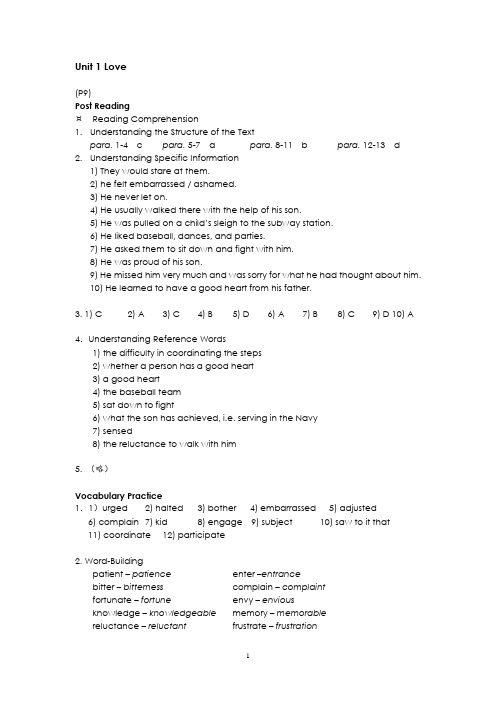
Unit 1 Love(P9)Post ReadingReading Comprehension1.Understanding the Structure of the Textpara. 1-4 c para. 5-7 a para. 8-11 b para. 12-13 d2.Understanding Specific Information1) They would stare at them.2) he felt embarrassed / ashamed.3) He never let on.4) He usually walked there with the help of his son.5) He was pulled on a child’s sleigh to the subway station.6) He liked baseball, dances, and parties.7) He asked them to sit down and fight with him.8) He was proud of his son.9) He missed him very much and was sorry for what he had thought about him.10) He learned to have a good heart from his father.3. 1) C 2) A 3) C 4) B 5) D 6) A 7) B 8) C 9) D 10) A 4.Understanding Reference Words1) the difficulty in coordinating the steps2) whether a person has a good heart3) a good heart4) the baseball team5) sat down to fight6) what the son has achieved, i.e. serving in the Navy7) sensed8) the reluctance to walk with him5. (略)Vocabulary Practice1.1)urged 2) halted 3) bother 4) embarrassed 5) adjusted6) complain 7) kid 8) engage 9) subject 10) saw to it that11) coordinate 12) participate2. Word-Buildingpatient –patience enter –entrancebitter –bitterness complain –complaintfortunate –fortune envy – enviousknowledge – knowledgeable memory –memorablereluctance – reluctant frustrate –frustration1)bitter 2) fortunate 3) patience 4) memorable 5) reluctant6) entrance 7) complaints 8) envious 9) knowledgeable 10) frustration Translation1.He walks slowly because of his bad leg.2.He came to the meeting despite his serious illness.3.He saw to it that the same mistake didn’t happen again.4.Now that they’ve got to know each other a little better, they get along justfine.5.Then I found myself surrounded by half a dozen dogs.6.I send you my best wishes on this happy occasion.Unit 2 Communication Problems(P45)Post ReadingReading Comprehension1.Understanding the Main Idea of the Passage1)different 2) problems 3) communication 4) translator 5) trust6) acceptance 7) exaggerate 8) superlative 9) metaphors10) generalizations 11) unsupportive 12) literally 13) rethink14) translate2.Understanding Specific Information1) F 2) T 3) F 4) T 5) T 6) F 7) T 8) T9) T 10) T3. (略)Vocabulary Practice1. 1) mess 2) repeat 3) mislead 4) intends 5) tend 6) exaggerates 7) frustrating 8) misinterpreted 9) acceptance 10) trust2.STEP ONE1) f 2) c 3) a 4) k 5) i 6) e 7) h 8) j 9) g 10) b 11) dSTEP TWO1) conveyed / conveys 2) assistance 3) encounter 4) conflict 5) emphasis 6) reacted 7) recognize 8) manner 9) assumed / assume 10) emerged / emerges 11) ignore 3.1) out 2) on 3) with 4) of 5) In 6) in 7) to 8)on 9) At 10) ofTranslation1.I went to the dentist yesterday to have a bad / decayed tooth pulled out.2.The development of thins depends fundamentally on internal causes.3.All roads lead to Rome.4.I meant to give you that book today, but I forgot to bring it with me.5.I was on the verge of accepting his advice.6.Divorce is not a matter you can afford to take lightly.Unit 10 Born to Win(P77)Post ReadingReading Comprehension1.Understanding the Organization of the Text(1)Introduction. (Para. 1)Each person is born with what he needs to win at life.(2)The meanings of “winner” and “loser” (Para. 2)A. A winner is one who responds genuinely by being trustworthy andresponsive, both as an individual and as a member of a society.B. A loser is one who fails to respond genuinely.(3)Few people are winners and losers all the time. (Para. 3)(4)Winners (Para. 4—7)Characteristics of a winnerA. A winner is genuine.B. A winner is independent in thinking.C. A winner is flexible.D. A winner has a love for life.E. A winner cares about the world and its people.(5)Losers (Para. 8—10)Possible causes: poor nutrition, cruelty, unhappy relationships, disease, continuing disappointments, and inadequate physical care, etc.Characteristics of a loserA.He is afraid to try new things.B. A loser has difficulty giving and receiving love.2.Understanding Specific Information1) C 2) D 3) AT 4) B 5) C3. (略)Vocabulary Practice1. 1) appreciateA. be thankful or grateful for感激B. recognize and enjoy the good qualities or worth of欣赏,赏识2) capacityA. the amount that something ca hold or contain容量,容积,容纳力B. ability or power能力,才能,力量3) channelA. n. a particular television channel频道B. v. direct something towards a particular purpose把。
《大学英语》教学教案unit2-2.doc
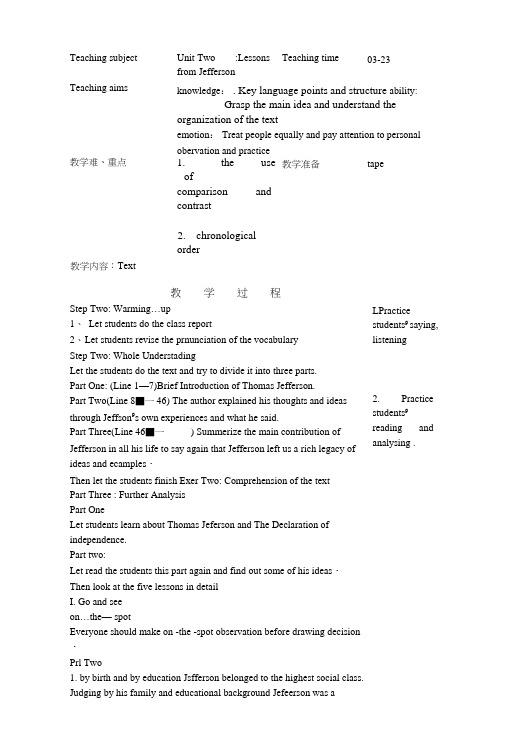
Teaching subject Unit Two :Lessonsfrom JeffersonTeaching time 03-23 Teaching aims knowledge:. Key language points and structure ability:Grasp the main idea and understand theorganization of the textemotion: Treat people equally and pay attention to personalobervation and practice教学难、重点 1.the useofcomparison andcontrast2.chronologicalorder教学准备tape教学内容:Text教学过程Step Two: Warming…up1、Let students do the class report2、L et students revise the prnunciation of the vocabularyStep Two: Whole UnderstadingLet the students do the text and try to divide it into three parts.Part One: (Line 1—7)Brief Introduction of Thomas Jefferson.Part Two(Line 8■一46) The author explained his thoughts and ideas through Jeffson9s own experiences and what he said.Part Three(Line 46■一) Summerize the main contribution of Jefferson in all his life to say again that Jefferson left us a rich legacy of ideas and ecamples・Then let the students finish Exer Two: Comprehension of the textPart Three : Further AnalysisPart OneLet students learn about Thomas Jeferson and The Declaration of independence.Part two:Let read the students this part again and find out some of his ideas・Then look at the five lessons in detailI. Go and seeon…the— spotEveryone should make on -the -spot observation before drawing decision ・Prl Two1. by birth and by education Jsfferson belonged to the highest social class. Judging by his family and educational background Jefeerson was a LPractice students9 saying, listening2. Practice students9 reading and analysing .‘ / 9 ✓八■ 4‘ ^1 ^il Q】 e ^1 T\板书设计教后记etmof anlery c otor t 1 s tede e m山ftnkm ohinfro ngt f。
大学英语跨文化交际 chapter2
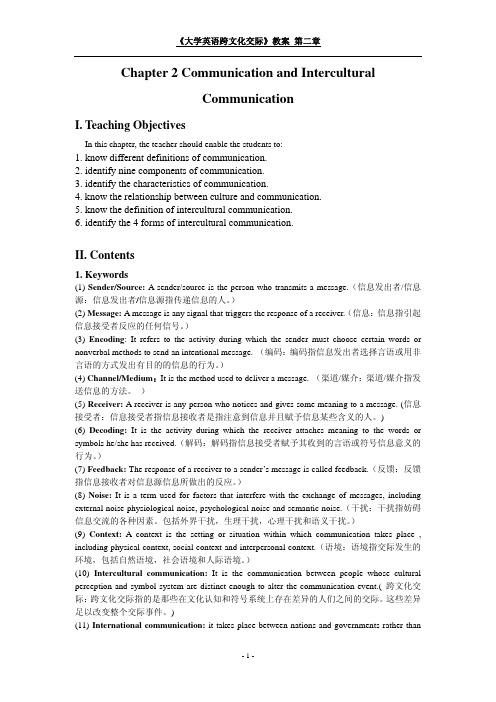
Chapter 2 Communication and InterculturalCommunicationI. Teaching ObjectivesIn this chapter, the teacher should enable the students to:1. know different definitions of communication.2. identify nine components of communication.3. identify the characteristics of communication.4. know the relationship between culture and communication.5. know the definition of intercultural communication.6. identify the 4 forms of intercultural communication.II. Contents1. Keywords(1) Sender/Source: A sender/source is the person who transmits a message.(信息发出者/信息源:信息发出者/信息源指传递信息的人。
)(2) Message: A message is any signal that triggers the response of a receiver.(信息:信息指引起信息接受者反应的任何信号。
)(3) Encoding: It refers to the activity during which the sender must choose certain words or nonverbal methods to send an intentional message. (编码:编码指信息发出者选择言语或用非言语的方式发出有目的的信息的行为。
- 1、下载文档前请自行甄别文档内容的完整性,平台不提供额外的编辑、内容补充、找答案等附加服务。
- 2、"仅部分预览"的文档,不可在线预览部分如存在完整性等问题,可反馈申请退款(可完整预览的文档不适用该条件!)。
- 3、如文档侵犯您的权益,请联系客服反馈,我们会尽快为您处理(人工客服工作时间:9:00-18:30)。
新编大学英语教案(第二册)_U n i t2C o m m u n i c a t i o nP r o b l e m s-CAL-FENGHAI-(2020YEAR-YICAI)_JINGBIANUnit TwoCommunication problemsTeaching Objectives1. Let the students have some ideas of the common ways we usually use in our daily life to communicate.2. Make the students find the efficient ways to communicate with each other.3. Let the students come up with the ways to avoid misunderstandings.Teaching allotmentsix academic hoursFocus points1.key words and phrasesassume, conflict, convey, emphasis, ignore, misinterpret, react, verge, feel like, for effect, on the verge of, pull out, take----lightly2.difficult sentences1) When Martians and Venusians first got together, they encountered many of the problems with relationships we have today.2) So when communication problems emerged, they assumed it was just one of those expected misunderstandings and that with a little assistance they would surely understand each other.3) To fully express their feelings, women would tend to exaggerate the facts a little bit for effect and use various superlatives, metaphors, and generalizations.3.grammar focusprefix “mis---”的不同意义Related InformationIt is well-known that learning a second language is never easy, and, generally speaking, the older one is when one attempts a new language, the more difficult it becomes. This is at least partly due to what is known as language interference, meaning that the linguistic patterns of our first language interfere with those of the second because no two languages have exactly the same sounds and grammatical structures. The English language has a very large vocabulary because it has incorporated words from many other languages over the centuries. This is nowhere more apparent than in its color words. For example, there are many words that express the color “purple”, describing its different shades and hues: mauve, violet, lilac, or lavender. An interesting2linguistic gender difference among native speakers of English is the likelihood of women using these color terms to differentiate between shades of purple, whereas, men will be satisfied with the one word “purple”. This is true of other color words too.Basing on what mentioned above, when learning a language, we sometimes need to pay attention to which sex uses which words, particularly when we reach an advanced stage where we are adding many new words to our vocabulary and want to use them accurately. We also need to pay attention to some of the multiple meanings that words have, as well as to their connotations.Suggested Class Activities1. Warming-up activity: How to communicate efficientlyPurpose: Inform the students the efficient way to communicate with each other Step 1 Discuss in groups about the common ways we usually use in our daily life to communicate and try to list both their advantages and disadvantages.Step 2 Make a comparison between them and decide which is the mostefficient way for us to communicate with others.Step 3 Ask some of the students to give their ideas in public and point out thenecessary points they should know in daily communication.Suggested words/expressions:admirable/neglect/comprehend/over-crowded/distinguish----from/holdback/in a different light/turn out.2. In-class reading activity: What can we get from communicationPurpose: Inform the students the good points of communicationStep 1. Discuss in groups why we need to communicate with othersStep 2. Try to analyze what communication has brought to usStep 3. Then make sure what we should learn from communicating with othersSuggested words/expressions:foreigner/uncommon/feel like/for effect/on the verge of/pull outFurther development:How to avoid misunderstandings in communicationAfter reading this unit, we may know that in our communications misunderstandings are quite common, so work in groups to come up with the ways to avoid misunderstandings and make it on your exercise book.In-Class Reading3Words and phrases1.assume v.1) believe something is true without definite proofe.g. You assumed his innocence / him to be innocent /that hi is innocentbefore hearing the evidence against him.He is not such a fool as you assumed him to be.assuming that---:假定----e.g. Assuming that you are right about this, what shall we do?2) to take up or undertakee.g. You will assume your new responsibilities tomorrow.assumption : n. sth. taken for granted ; sth. supposed but not provede.g. Don’t rely on the information she gave you---it’s pure assumption on her part.on the assumption that----以---为设想根据e.g. Let’s work on the assumption that our proposal will be accepted.Exercise:1) 他并非如你所以为的那样愚蠢。
